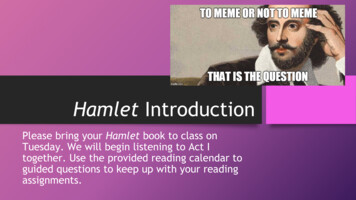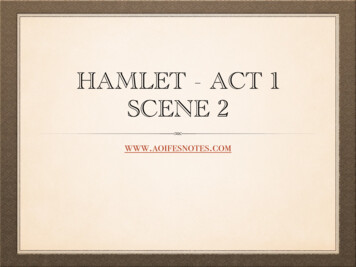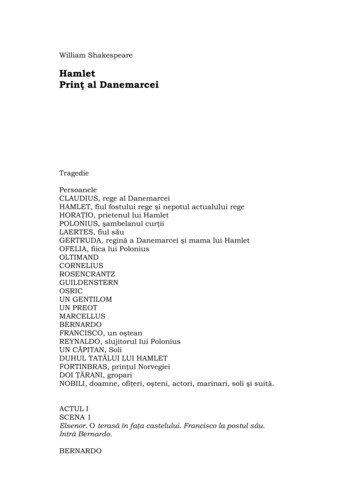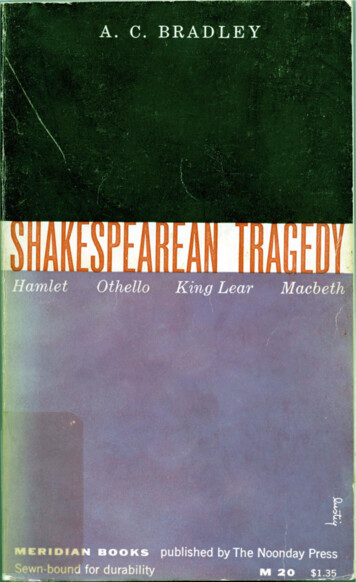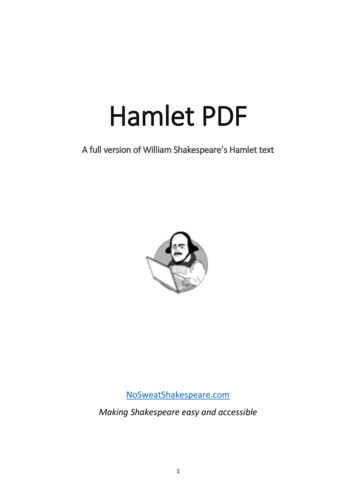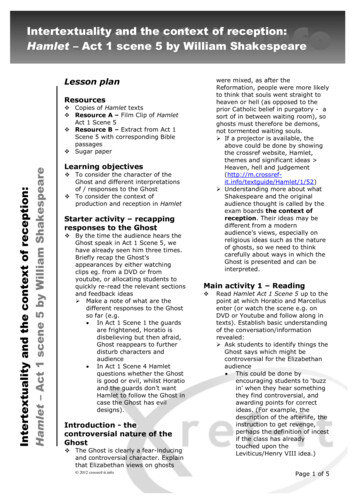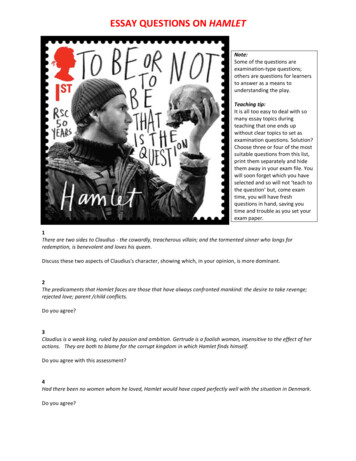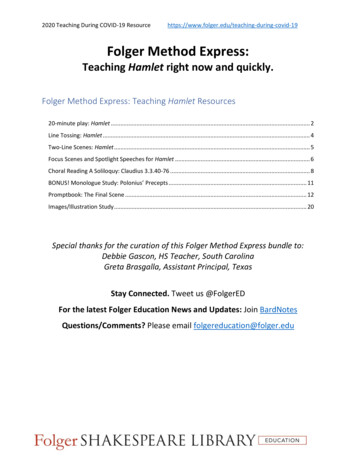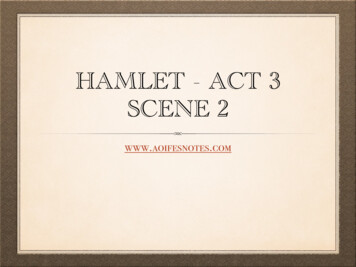
Transcription
William Shakespeare’sHamletIn Plain and Simple EnglishA SwipeSpeare Bookwww.SwipeSpeare.com 2014. All Rights Reserved.
About This SeriesThe “SwipeSpeare ” series started as a way of telling Shakespeare for the modern reader—being careful to preserve the themes and integrity of the original. Visit our websiteSwipeSpeare.com to see other books in the series, as well as the interactive, and swipe-able, app!The series is expanding every month. Visit BookCaps.com to see non-Shakespeare books in thisseries, and while you are there join the Facebook page, so you are first to know when a new bookcomes out.
CharactersClaudius, King of Denmark.Hamlet, Son to the former, and Nephew to the present King.Polonius, Lord Chamberlain.Horatio, Friend to Hamlet.Laertes, Son to Polonius.Voltimand, Courtier.Cornelius, Courtier.Rosencrantz, Courtier.Guildenstern, Courtier.Osric, Courtier.A Gentleman, Courtier.A Priest.Marcellus, Officer.Bernardo, Officer.Francisco, a SoldierReynaldo, Servant to Polonius.Players.Two Clowns, Grave-diggers.Fortinbras, Prince of Norway.A Captain.English Ambassadors.Ghost of Hamlet's Father.Gertrude, Queen of Denmark, and Mother of Hamlet.Ophelia, Daughter to Polonius.Lords, Ladies, Officers, Soldiers, Sailors, Messengers, and otherAttendants.
Comparative Version
Act I
Scene IElsinore. A platform before the castleFRANCISCO at his post. Enter to him BERNARDOBERNARDOWho’s there?Who's there?FRANCISCONo, you answer me. Identify yourself.Nay, answer me: stand, and unfold yourself.BERNARDOI am an officer in the king’s court.Long live the king!FRANCISCOBernardo, is that you?Bernardo?BERNARDOYes.He.FRANCISCOYou are late.You come most carefully upon your hour.BERNARDOIt’s only twelve o’ clock. Go to bed already, Francisco.'Tis now struck twelve; get thee to bed, Francisco.FRANCISCOThanks. It’s cold and I am sick of it.For this relief much thanks: 'tis bitter cold,And I am sick at heart.BERNARDOHave things been quiet on your guard?Have you had quiet guard?FRANCISCOQuiet as a mouse.Not a mouse stirring.
BERNARDOWell, good night. If you see Horatio and Marcellus, tell them to hurry up.Well, good night.If you do meet Horatio and Marcellus,The rivals of my watch, bid them make haste.FRANCISCOI think I hear them now. Stop! Who’s there?I think I hear them. Stand, ho! Who's there?Enter HORATIO and MARCELLUSHORATIOWe are friends.Friends to this ground.MARCELLUSAnd we work for the Dane.And liegemen to the Dane.FRANCISCOBe on your way then.Give you good night.MARCELLUSGoodbye, soldier. Who has relieved you?O, farewell, honest soldier:Who hath relieved you?FRANCISCOBernardo took my place. Good night.Bernardo has my place.Give you good night.ExitMARCELLUSHey! Bernardo!Holla! Bernardo!BERNARDOWhat? Is that you, Horatio?Say,What, is Horatio there?HORATIO
A part of me is here.A piece of him.BERNARDOWelcome, Horatio and Marcellus.Welcome, Horatio: welcome, good Marcellus.MARCELLUSHas that thing appeared again tonight?What, has this thing appear'd again to-night?BERNARDOI haven’t seen anything.I have seen nothing.MARCELLUSHoratio doesn’t believe me; says it is all in my head. We have seen the ghost twice, so I invitedhim to stand guard with us tonight. If the apparition comes, he will see for himself.Horatio says 'tis but our fantasy,And will not let belief take hold of himTouching this dreaded sight, twice seen of us:Therefore I have entreated him alongWith us to watch the minutes of this night;That if again this apparition come,He may approve our eyes and speak to it.HORATIONonsense. It will not appear again.Tush, tush, 'twill not appear.BERNARDOLet’s sit down and we will tell you, although you are skeptical, what we have seen the last twonights.Sit down awhile;And let us once again assail your ears,That are so fortified against our storyWhat we have two nights seen.HORATIOOk, let’s sit. I will listen to Bernardo’s story.Well, sit we down,And let us hear Bernardo speak of this.BERNARDOLast night, about one o’clock, with the light from that star in the west, Marcellus and I—
Last night of all,When yond same star that's westward from the poleHad made his course to illume that part of heavenWhere now it burns, Marcellus and myself,The bell then beating one,-Enter GhostMARCELLUSBe quiet. Look, here it comes again!Peace, break thee off; look, where it comes again!BERNARDOIt looks just like the dead king.In the same figure, like the king that's dead.MARCELLUSYou are smart, Horatio, speak to it.Thou art a scholar; speak to it, Horatio.BERNARDOIt does look like the king; doesn’t it, Horatio?Looks it not like the king? mark it, Horatio.HORATIOIt does, and I’m both scared and curious.Most like: it harrows me with fear and wonder.BERNARDOIt acts like it wants to say something.It would be spoke to.MARCELLUSAsk it something, Horatio.Question it, Horatio.HORATIOWhat are you out at the time of night ready for war and resembling the dead king of Denmark?In the name of God, say something!What art thou that usurp'st this time of night,Together with that fair and warlike formIn which the majesty of buried DenmarkDid sometimes march? by heaven I charge thee, speak!MARCELLUSIt is offended.
It is offended.BERNARDOSee, it’s going away!See, it stalks away!HORATIOWait, stay. Speak! I command you to speak!Stay! speak, speak! I charge thee, speak!Exit GhostMARCELLUSIt’s gone and would not say anything.'Tis gone, and will not answer.BERNARDOWhat do you think now, Horatio? You look a little pale and scared. You think it’s more thansome fantasy?How now, Horatio! you tremble and look pale:Is not this something more than fantasy?What think you on't?HORATIOI swear, I never would have believed if I hadn’t seen it with my own eyes.Before my God, I might not this believeWithout the sensible and true avouchOf mine own eyes.MARCELLUSDoesn’t it look like the king?Is it not like the king?HORATIOI know that armor as well as I know myself. He wore it during the battle with Norway when hekilled the Polacks on their sleds. So strange.As thou art to thyself:Such was the very armour he had onWhen he the ambitious Norway combated;So frown'd he once, when, in an angry parle,He smote the sledded Polacks on the ice.'Tis strange.MARCELLUSThis is the second time at this very hour that it has walked around like a soldier.
Thus twice before, and jump at this dead hour,With martial stalk hath he gone by our watch.HORATIOI don’t know what this means, but I have a funny feeling something is going to happen in ourcountry.In what particular thought to work I know not;But in the gross and scope of my opinion,This bodes some strange eruption to our state.MARCELLUSOkay, let’s sit down and talk about what is going on. Why do we stand guard every night, andwhy are cannons being made? Why are we buying foreign weapons and ships are being builtevery day of the week. Do you think something is about to happen?Good now, sit down, and tell me, he that knows,Why this same strict and most observant watchSo nightly toils the subject of the land,And why such daily cast of brazen cannon,And foreign mart for implements of war;Why such impress of shipwrights, whose sore taskDoes not divide the Sunday from the week;What might be toward, that this sweaty hasteDoth make the night joint-labourer with the day:Who is't that can inform me?HORATIOI think I know. As you know, the king, we just saw in his ghostly form, was the enemy ofFortinbras, the king of Norway. Fortinbras dared the king to fight and was killed by theseemingly valiant Hamlet. According to a signed contract, Fortinbras forfeited his land, as wellas his life, to his conqueror. Our king had signed a similar contract. Now, his son, the youngFortinbras, seeks revenge and the return of his father’s land. He has commissioned the help ofsome lawless men. I think that is the reason for the frenzy of activity, including our watch and theprocurement of weapons.That can I;At least, the whisper goes so. Our last king,Whose image even but now appear'd to us,Was, as you know, by Fortinbras of Norway,Thereto prick'd on by a most emulate pride,Dared to the combat; in which our valiant Hamlet-For so this side of our known world esteem'd him-Did slay this Fortinbras; who by a seal'd compact,Well ratified by law and heraldry,Did forfeit, with his life, all those his landsWhich he stood seized of, to the conqueror:Against the which, a moiety competentWas gaged by our king; which had return'd
To the inheritance of Fortinbras,Had he been vanquisher; as, by the same covenant,And carriage of the article design'd,His fell to Hamlet. Now, sir, young Fortinbras,Of unimproved mettle hot and full,Hath in the skirts of Norway here and thereShark'd up a list of lawless resolutes,For food and diet, to some enterpriseThat hath a stomach in't; which is no other-As it doth well appear unto our state-But to recover of us, by strong handAnd terms compulsatory, those foresaid landsSo by his father lost: and this, I take it,Is the main motive of our preparations,The source of this our watch and the chief headOf this post-haste and romage in the land.BERNARDOI think you’re right. That explains why the king, responsible for these wars, comes walkingaround in his armor on our watch.I think it be no other but e'en so:Well may it sort that this portentous figureComes armed through our watch; so like the kingThat was and is the question of these wars.HORATIOThere is definitely trouble brewing. Even in the great city of Rome, before the murder of JuliusCaesar, the dead arose from their graves and walked the streets, speaking gibberish. There wereother signs and omens, too, like shooting stars and solar eclipses. The fates are warning us. Butwait! Here comes the ghost again! (Enter Ghost.) I’ll go to it, even though I don’t want to. Stay,ghost. If you can, speak to me. If there is anything I can do to ease your pain, tell me. Or, if youknow something that would help our country, please speak. If you have some hidden treasurehere on earth, which makes you uneasy, let us help you. (The cock crows.) Stay and speak! Stopthe ghost, Marcellus.A mote it is to trouble the mind's eye.In the most high and palmy state of Rome,A little ere the mightiest Julius fell,The graves stood tenantless and the sheeted deadDid squeak and gibber in the Roman streets:As stars with trains of fire and dews of blood,Disasters in the sun; and the moist starUpon whose influence Neptune's empire standsWas sick almost to doomsday with eclipse:And even the like precurse of fierce events,As harbingers preceding still the fatesAnd prologue to the omen coming on,
Have heaven and earth together demonstratedUnto our climatures and countrymen.-But soft, behold! lo, where it comes again!Re-enter GhostI'll cross it, though it blast me. Stay, illusion!If thou hast any sound, or use of voice,Speak to me:If there be any good thing to be done,That may to thee do ease and grace to me,Speak to me:Cock crowsIf thou art privy to thy country's fate,Which, happily, foreknowing may avoid, O, speak!Or if thou hast uphoarded in thy lifeExtorted treasure in the womb of earth,For which, they say, you spirits oft walk in death,Speak of it: stay, and speak! Stop it, Marcellus.MARCELLUSShould I hit it with my sword?Shall I strike at it with my partisan?HORATIOYes, if it doesn’t stop.Do, if it will not stand.BERNARDOIt’s here!'Tis here!HORATIOIt’s here!'Tis here!MARCELLUSIt’s gone! (Exit Ghost.) We shouldn’t have used force on the ghost of the king. Anyway, it is anapparition and can’t be touched. We were stupid to think otherwise.'Tis gone!Exit GhostWe do it wrong, being so majestical,To offer it the show of violence;For it is, as the air, invulnerable,And our vain blows malicious mockery.BERNARDOIt was about to speak when the cock crowed.
It was about to speak, when the cock crew.HORATIOAnd then it started to act scared like someone guilty of a crime. I have heard when the cockcrows, a sign that day is approaching, ghosts must return to where their spirits are confined. Wejust saw that for ourselves.And then it started like a guilty thingUpon a fearful summons. I have heard,The cock, that is the trumpet to the morn,Doth with his lofty and shrill-sounding throatAwake the god of day; and, at his warning,Whether in sea or fire, in earth or air,The extravagant and erring spirit hisTo his confine: and of the truth hereinThis present object made probation.MARCELLUSIt also started to fade when the cock crowed. Some say, at Christmas, the rooster crows all nightlong, and ghosts, fairies, and witches are too fearful to work, because the time is so sacred.It faded on the crowing of the cock.Some say that ever 'gainst that season comesWherein our Saviour's birth is celebrated,The bird of dawning singeth all night long:And then, they say, no spirit dares stir abroad;The nights are wholesome; then no planets strike,No fairy takes, nor witch hath power to charm,So hallow'd and so gracious is the time.HORATIOI have heard that, too, and partially believe it. But, the morning is near, and I think we shouldtell Hamlet what we have seen. The spirit does not know us, but I bet my life, he will speak tohim. Do you agree we should tell Hamlet about the ghost?So have I heard and do in part believe it.But, look, the morn, in russet mantle clad,Walks o'er the dew of yon high eastward hill:Break we our watch up; and by my advice,Let us impart what we have seen to-nightUnto young Hamlet; for, upon my life,This spirit, dumb to us, will speak to him.Do you consent we shall acquaint him with it,As needful in our loves, fitting our duty?MARCELLUSLet’s do it, and I know where he is this morning, a most convenient place.Let's do't, I pray; and I this morning knowWhere we shall find him most conveniently.
Exeunt
Scene IIA room of state in the castleEnter KING CLAUDIUS, QUEEN GERTRUDE, HAMLET, POLONIUS, LAERTES,VOLTIMAND, CORNELIUS, Lords, and AttendantsKING CLAUDIUSAlthough we are still mourning our dear brother Hamlet’s death, and the country is joined bygrief, we must remember to continue on in life. It is with both sadness and joy, that I havemarried my sister-in-law, as you all advised. For your wisdom, I thank you. Now, as you allknow, the young Fortinbras thinks since the king has died, we are in vulnerable state. He hassent letters stating his desire to regain the land his father lost in battle to Hamlet. So, I havewritten a letter to his uncle, the poor bed-ridden fellow, to let him know what Fortinbras isplanning. The letter asks his uncle, who in the head of Norway, to stop his nephew. I ask of you,Cornelius and Votimand, to deliver this letter and nothing else. Please be quick in fulfilling yourduty.Though yet of Hamlet our dear brother's deathThe memory be green, and that it us befittedTo bear our hearts in grief and our whole kingdomTo be contracted in one brow of woe,Yet so far hath discretion fought with natureThat we with wisest sorrow think on him,Together with remembrance of ourselves.Therefore our sometime sister, now our queen,The imperial jointress to this warlike state,Have we, as 'twere with a defeated joy,-With an auspicious and a dropping eye,With mirth in funeral and with dirge in marriage,In equal scale weighing delight and dole,-Taken to wife: nor have we herein barr'dYour better wisdoms, which have freely goneWith this affair along. For all, our thanks.Now follows, that you know, young Fortinbras,Holding a weak supposal of our worth,Or thinking by our late dear brother's deathOur state to be disjoint and out of frame,Colleagued with the dream of his advantage,He hath not fail'd to pester us with message,Importing the surrender of those landsLost by his father, with all bonds of law,To our most valiant brother. So much for him.Now for ourself and for this time of meeting:Thus much the business is: we have here writTo Norway, uncle of young Fortinbras,-Who, impotent and bed-rid, scarcely hears
Of this his nephew's purpose,--to suppressHis further gait herein; in that the levies,The lists and full proportions, are all madeOut of his subject: and we here dispatchYou, good Cornelius, and you, Voltimand,For bearers of this greeting to old Norway;Giving to you no further personal powerTo business with the king, more than the scopeOf these delated articles allow.Farewell, and let your haste commend your duty.CORNELIUS VOLTIMANDWe will do our best.In that and all things will we show our duty.KING CLAUDIUSWe have no doubt you will. Farewell. (Exit Voltimand and Cornelius.) And now, Laertes, what’snew with you? You said you had something to ask me. What is it? Don’t worry, you can ask meanything. Your father is an important man to the throne of Denmark. What do you want to ask?We doubt it nothing: heartily farewell.Exeunt VOLTIMAND and CORNELIUSAnd now, Laertes, what's the news with you?You told us of some suit; what is't, Laertes?You cannot speak of reason to the Dane,And loose your voice: what wouldst thou beg, Laertes,That shall not be my offer, not thy asking?The head is not more native to the heart,The hand more instrumental to the mouth,Than is the throne of Denmark to thy father.What wouldst thou have, Laertes?LAERTESI would like to ask you, if I may return to France. Since, I came from France for the sole purposeof attending your coronation, and with that duty done, I would like to return. Please let me goback to France.My dread lord,Your leave and favour to return to France;From whence though willingly I came to Denmark,To show my duty in your coronation,Yet now, I must confess, that duty done,My thoughts and wishes bend again toward FranceAnd bow them to your gracious leave and pardon.KING CLAUDIUSDo you have your father’s permission? What does Polonius say about this?Have you your father's leave? What says Polonius?
LORD POLONIUSI have given him permission after he asked and asked. So, I ask you to allow him to return toFrance.He hath, my lord, wrung from me my slow leaveBy laboursome petition, and at lastUpon his will I seal'd my hard consent:I do beseech you, give him leave to go.KING CLAUDIUSThen, I agree, too. This is the best time in your life, Laertes, spend it as you will. Now, mynephew, Hamlet, and my son-Take thy fair hour, Laertes; time be thine,And thy best graces spend it at thy will!But now, my cousin Hamlet, and my son,-HAMLET[Aside]I am more kin than I am kind.A little more than kin, and less than kind.KING CLAUDIUSWhy are you still sad? You look like a cloud is hanging over your head.How is it that the clouds still hang on you?HAMLETThat’s not true, sir. I am in the sun quite a bit.Not so, my lord; I am too much i' the sun.QUEEN GERTRUDEDear Hamlet, you must stop being so dark and depressed. It’s time you rejoin the living. Youcannot bring your father back, as every living thing must die and enter eternity.Good Hamlet, cast thy nighted colour off,And let thine eye look like a friend on Denmark.Do not for ever with thy vailed lidsSeek for thy noble father in the dust:Thou know'st 'tis common; all that lives must die,Passing through nature to eternity.HAMLETYes, ma’am. I know.Ay, madam, it is common.QUEEN GERTRUDEIf you know, then why does it seem you don’t?If it be,
Why seems it so particular with thee?HAMLETSeems, mother! It does not seem; it is. I may wear black clothes or behave sadly, but I do itbecause I am sad, not because I am pretending to be sad.Seems, madam! nay it is; I know not 'seems.''Tis not alone my inky cloak, good mother,Nor customary suits of solemn black,Nor windy suspiration of forced breath,No, nor the fruitful river in the eye,Nor the dejected 'havior of the visage,Together with all forms, moods, shapes of grief,That can denote me truly: these indeed seem,For they are actions that a man might play:But I have that within which passeth show;These but the trappings and the suits of woe.KING CLAUDIUSIt is natural and proper for you to grieve over your father. Everyone loses a father, and the lovedones are sorrowful for some time. You have taken your mourning period too far. You areshowing yourself to be stubborn and unmanly. You are going against the very nature of heavenand acting like a simple-minded, uneducated fool. It is a sin, continuing to act like this, so stopbeing so sad. We want you to think of me as your father, since you are heir to the throne. Wewant everyone to see that I love you like a son. We do not want you to go back to school inWittenberg, but stay here where we can keep an eye on you, the best member of our court, mynephew and son.'Tis sweet and commendable in your nature, Hamlet,To give these mourning duties to your father:But, you must know, your father lost a father;That father lost, lost his, and the survivor boundIn filial obligation for some termTo do obsequious sorrow: but to perseverIn obstinate condolement is a courseOf impious stubbornness; 'tis unmanly grief;It shows a will most incorrect to heaven,A heart unfortified, a mind impatient,An understanding simple and unschool'd:For what we know must be and is as commonAs any the most vulgar thing to sense,Why should we in our peevish oppositionTake it to heart? Fie! 'tis a fault to heaven,A fault against the dead, a fault to nature,To reason most absurd: whose common themeIs death of fathers, and who still hath cried,From the first corse till he that died to-day,'This must be so.' We pray you, throw to earth
This unprevailing woe, and think of usAs of a father: for let the world take note,You are the most immediate to our throne;And with no less nobility of loveThan that which dearest father bears his son,Do I impart toward you. For your intentIn going back to school in Wittenberg,It is most retrograde to our desire:And we beseech you, bend you to remainHere, in the cheer and comfort of our eye,Our chiefest courtier, cousin, and our son.QUEEN GERTRUDEI pray you stay with us, Hamlet. Do not go back to Wittenberg.Let not thy mother lose her prayers, Hamlet:I pray thee, stay with us; go not to Wittenberg.HAMLETI will do my best to not disappoint you, mother.I shall in all my best obey you, madam.KING CLAUDIUSThat’s a good answer: you are a true Dane. Dear wife, come. I am so happy with Hamlet’sdecision, I would like to drink a toast to his health. Let’s tell all of Denmark the happy news.Let’s shout it to the heavens. Let’s go.Why, 'tis a loving and a fair reply:Be as ourself in Denmark. Madam, come;This gentle and unforced accord of HamletSits smiling to my heart: in grace whereof,No jocund health that Denmark drinks to-day,But the great cannon to the clouds shall tell,And the king's rouse the heavens all bruit again,Re-speaking earthly thunder. Come away.Exeunt all but HAMLETHAMLETI feel as though my flesh will melt. I wish that God did not view suicide as a sin! Oh, God! Oh,God! This world is so unfair and it seems so useless. Damn this world! Damn, this world like agarden that grows weeds. How did it come to this? My father has only been dead two months,not even two months. He was so loving to my mother. He never raised a hand to her, and sheclung to him; yet, within a month I can’t even think of it! Frailty is a woman. My shoes are noteven a month old. She forgets my poor father and replaces him with another. An animal withoutreason would have mourned longer. She should not have married my uncle, my father’s brother,who is no more like my father than I am like Hercules. Within a month, the salt of her tears had
not even left her eyes, and she remarried. She sped with ease to make a bed of incest which cancome to no good. But, even though it breaks my heart, I must hold my tongue!O, that this too too solid flesh would meltThaw and resolve itself into a dew!Or that the Everlasting had not fix'dHis canon 'gainst self-slaughter! O God! God!How weary, stale, flat and unprofitable,Seem to me all the uses of this world!Fie on't! ah fie! 'tis an unweeded garden,That grows to seed; things rank and gross in naturePossess it merely. That it should come to this!But two months dead: nay, not so much, not two:So excellent a king; that was, to this,Hyperion to a satyr; so loving to my motherThat he might not beteem the winds of heavenVisit her face too roughly. Heaven and earth!Must I remember? why, she would hang on him,As if increase of appetite had grownBy what it fed on: and yet, within a month-Let me not think on't--Frailty, thy name is woman!-A little month, or ere those shoes were oldWith which she follow'd my poor father's body,Like Niobe, all tears:--why she, even she-O, God! a beast, that wants discourse of reason,Would have mourn'd longer--married with my uncle,My father's brother, but no more like my fatherThan I to Hercules: within a month:Ere yet the salt of most unrighteous tearsHad left the flushing in her galled eyes,She married. O, most wicked speed, to postWith such dexterity to incestuous sheets!It is not nor it cannot come to good:But break, my heart; for I must hold my tongue.Enter HORATIO, MARCELLUS, and BERNARDOHORATIOHello, my lord!Hail to your lordship!HAMLETI am glad to see you are doing well, Horatio.I am glad to see you well:Horatio,--or I do forget myself.HORATIO
I feel the same, my lord. I am forever your poor servant.The same, my lord, and your poor servant ever.HAMLETSir, my good friend, I’ll change places with you. Horatio and Marcellus, what is going on inWittenberg?Sir, my good friend; I'll change that name with you:And what make you from Wittenberg, Horatio? Marcellus?MARCELLUSMy good lord My good lord-HAMLETI am very happy to see you. Very happy. But, tell me what is going on in Wittenberg.I am very glad to see you. Good even, sir.But what, in faith, make you from Wittenberg?HORATIOWe are too late my lord.A truant disposition, good my lord.HAMLETI don’t think you enemy would say that, so I don’t want to hear it, either. You are never too late.Why are you here in Elsinore? We’ll teach you how to drink before you leave.I would not hear your enemy say so,Nor shall you do mine ear that violence,To make it truster of your own reportAgainst yourself: I know you are no truant.But what is your affair in Elsinore?We'll teach you to drink deep ere you depart.HORATIOMy lord, I came to attend your father’s funeral.My lord, I came to see your father's funeral.HAMLETDon’t insult me. I think you came to see my mother’s wedding.I pray thee, do not mock me, fellow-student;I think it was to see my mother's wedding.HORATIOTrue, my lord, the wedding did happen quickly after the death of your father.Indeed, my lord, it follow'd hard upon.HAMLET
Too quickly, Horatio! The food prepared for the funeral was served on the wedding tables. Iwould rather have died than live to see that day, Horatio! My father, I think I see him.Thrift, thrift, Horatio! the funeral baked meatsDid coldly furnish forth the marriage tables.Would I had met my dearest foe in heavenOr ever I had seen that day, Horatio!My father!--methinks I see my father.HORATIOWhere, my lord?Where, my lord?HAMLETOnly in my imagination, Horatio.In my mind's eye, Horatio.HORATIOI saw him once. He was a good king.I saw him once; he was a goodly king.HAMLETHe was a man, one like I will never meet again.He was a man, take him for all in all,I shall not look upon his like again.HORATIOMy lord, I think I saw him last night.My lord, I think I saw him yesternight.HAMLETSaw who?Saw? who?HORATIOMy lord, the king, your father.My lord, the king your father.HAMLETThe king, my father!The king my father!HORATIOHold on. Don’t get so excited, until you hear the whole crazy story, witnessed by thesegentlemen.Season your admiration for awhileWith an attent ear, till I may deliver,
Upon the witness of these gentlemen,This marvel to you.HAMLETFor the love of God, tell me.For God's love, let me hear.HORATIOThese gentlemen, Marcellus and Bernardo, on their watch in the middle of the night, wereencountered by a figure like your father. It was armed and dressed exactly like him, and marchedin front of their frightened eyes. They did not speak to him because they were so afraid. So, theytold me about it and I went with them last night to keep watch. Just like they reported, I saw theapparition. I knew your father, and the ghost looked just like him.Two nights together had these gentlemen,Marcellus and Bernardo, on their watch,In the dead vast and middle of the night,Been thus encounter'd. A figure like your father,Armed at point exactly, cap-a-pe,Appears before them, and with solemn marchGoes slow and stately by them: thrice he walk'dBy their oppress'd and fear-surprised eyes,Within his truncheon's length; whilst they, distilledAlmost to jelly with the act of fear,Stand dumb and speak not to him. This to meIn dreadful secrecy impart they did;And I with them the third night kept the watch;Where, as they had deliver'd, both in time,Form of the thing, each word made true and good,The apparition comes: I knew your father;These hands are not more like.HAMLETBut, where was this?But where was this?MARCELLUSMy lord, from the platform where they keep watch.My lord, upon the platform where we watch'd.HAMLETDid you speak to it?Did you not speak to it?HORATIO
I did, my lord. But it did not answer. Although, I thought it lifted up its head and acted as if itwere going to speak. Then, the morning cock crowed and the ghost quickly walked away andvanished from our sight.My lord, I did;But answer made it none: yet once methoughtIt lifted up its head and did addressItself to motion, like as it would speak;But even then the morning cock crew loud,And at the sound it shrunk in haste away,And vanish'd from our sight.HAMLETThis is very strange.'Tis very strange.HORATIOIt is, but it is true, my lord. We thought it our duty to let you know.As I do live, my honour'd lord, 'tis true;And we did think it writ down in our dutyTo let you know of it.HAMLETYes, indeed, gentlemen, but this troubles me. Are you on watch tonight?Indeed, indeed, sirs, but this troubles me.Hold you the watch to-night?MARCELLUS BERNARDOYes, my lord.
series, and while you are there join the Facebook page, so you are first to know when a new book . Hamlet, Son to the former, and Nephew to the present King. Polonius, Lord Chamberlain. Horatio, Friend to Hamlet. Laertes, Son to Polonius. Voltimand, Courtier. Cornelius,
